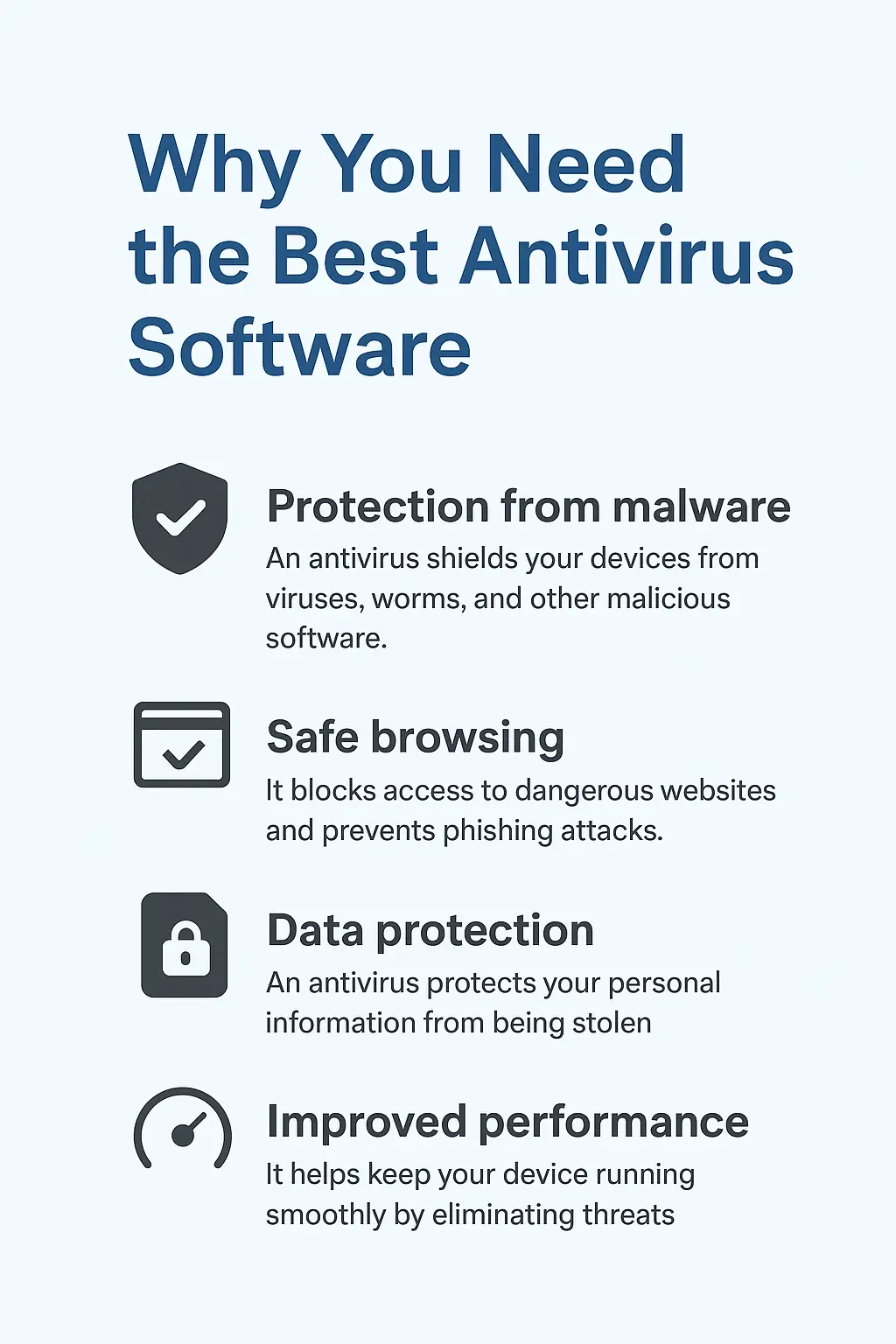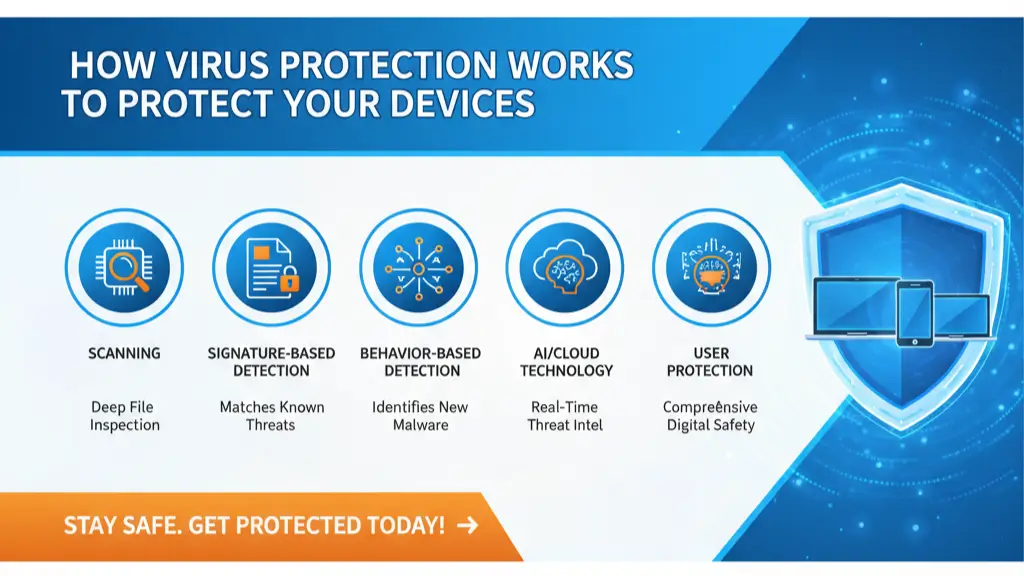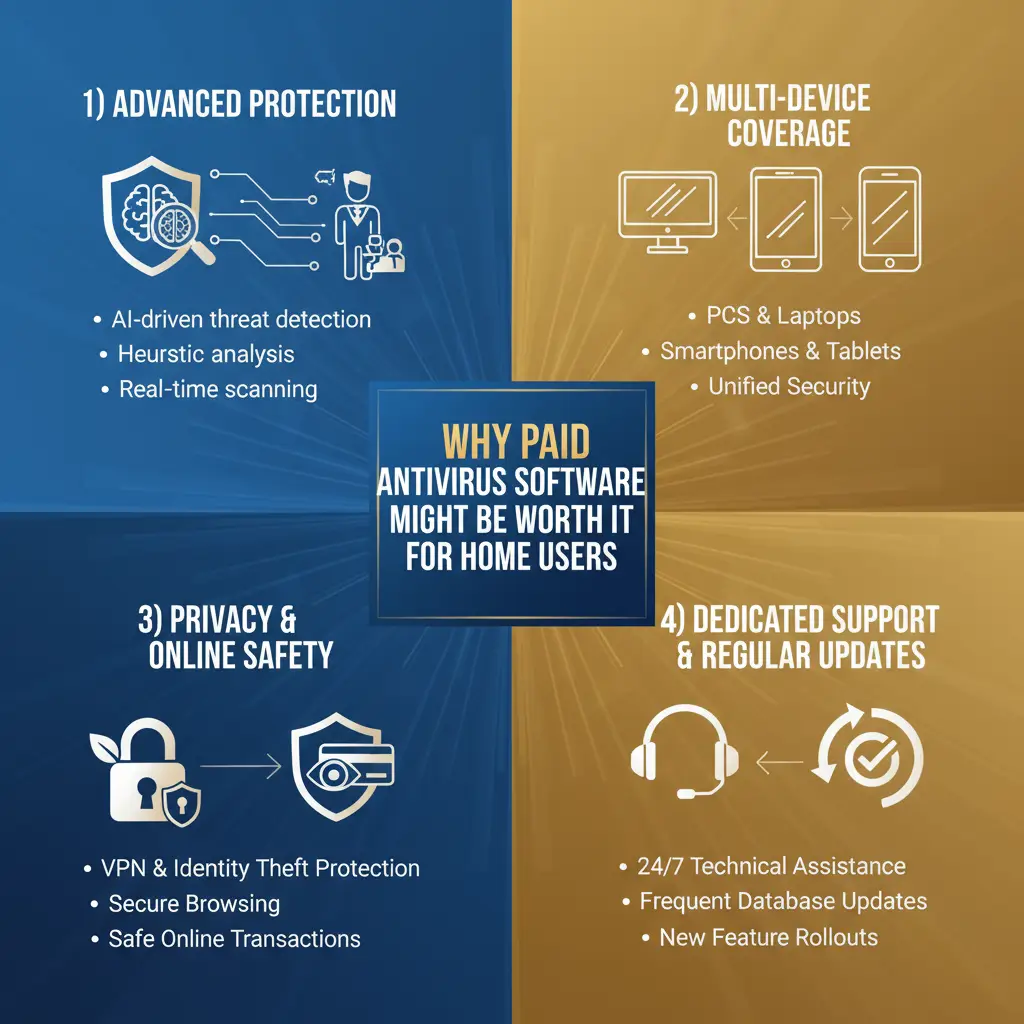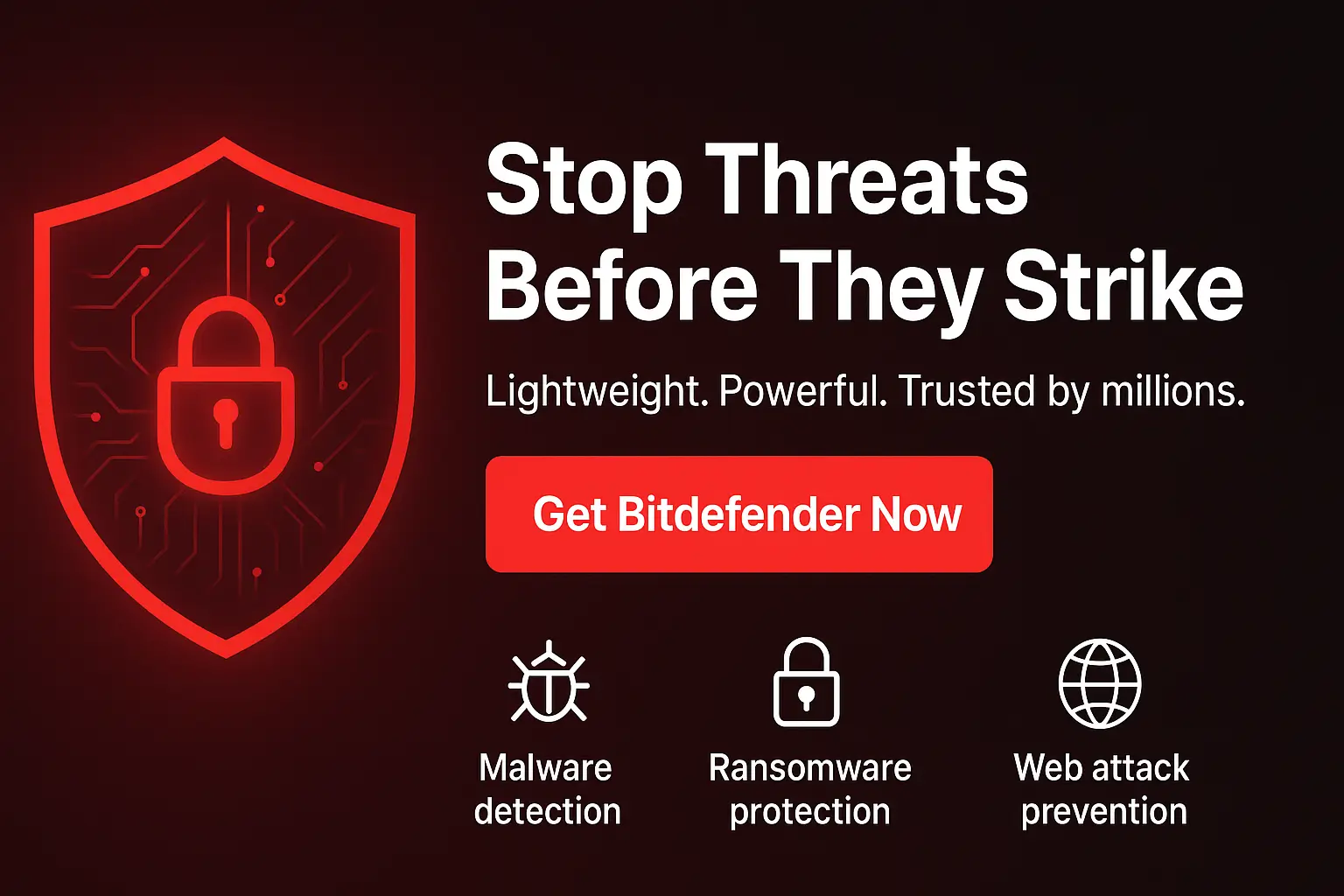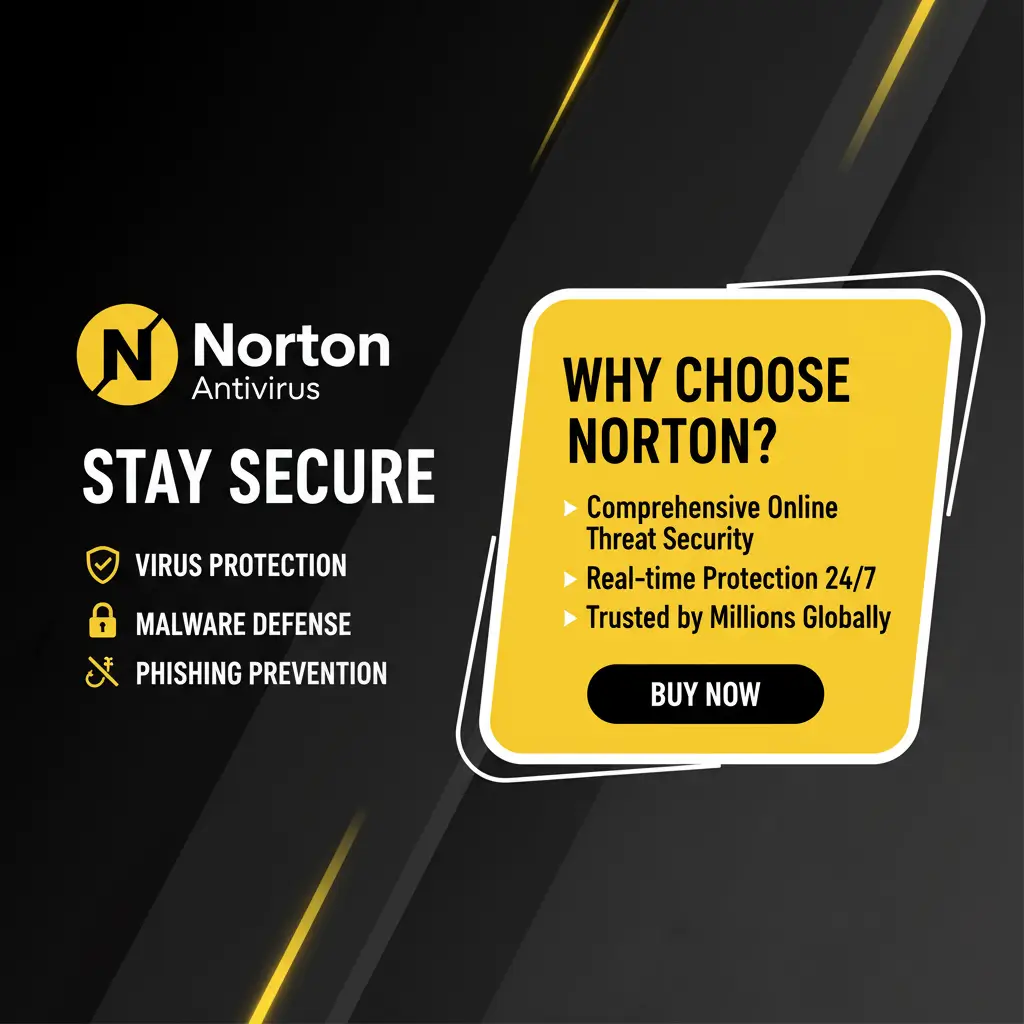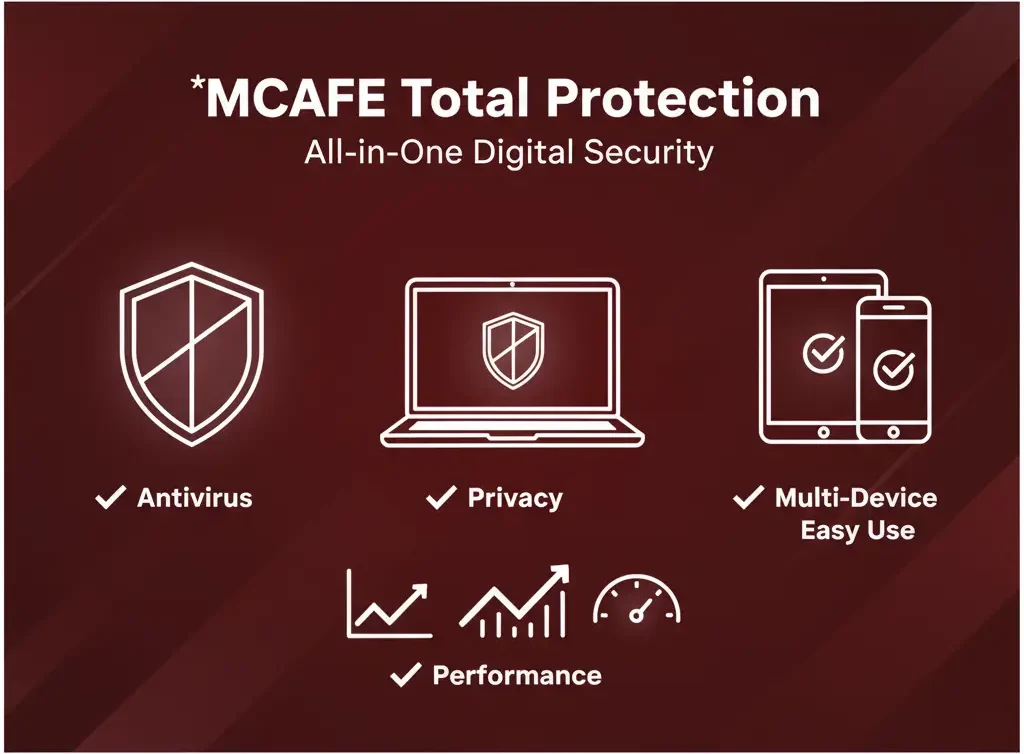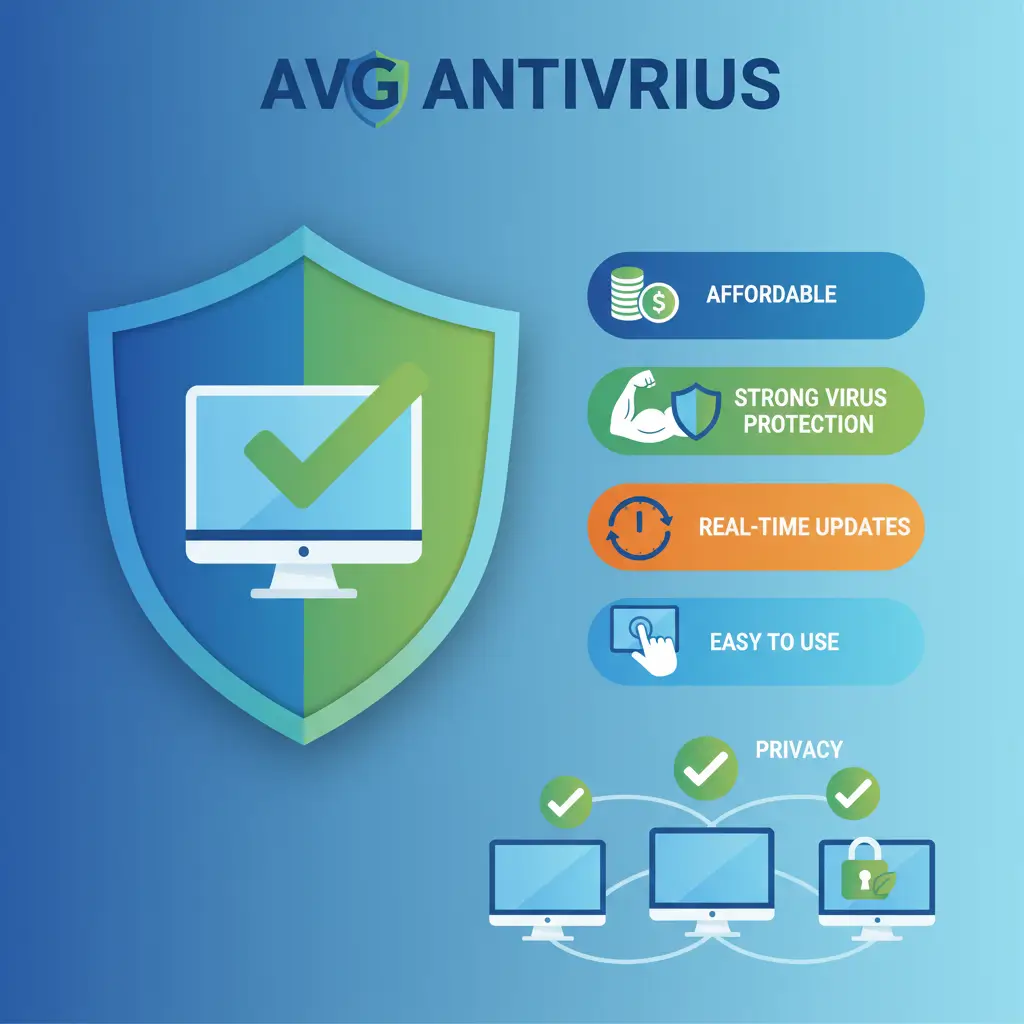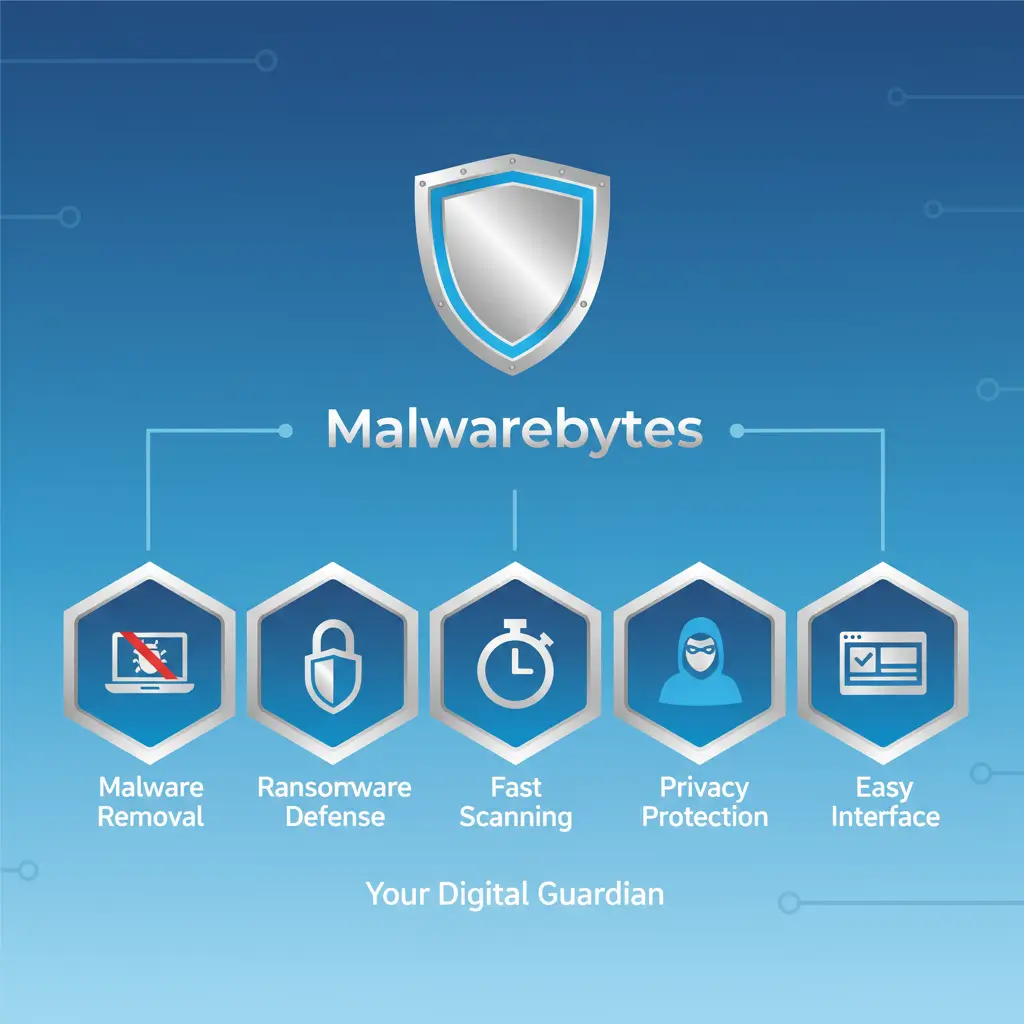Best Antivirus Software for Home Users in 2025: Top Picks & Buying Guide
Finding the best antivirus software for the home user’s computer is very important.
On the other hand, there are lots of cyber threats like viruses, malware, ransomware, and phishing attacks that create a problem in the computer and put personal data at risk.
Nevertheless, with the right and best security software, you can keep your computer safe, protect files, and improve system performance.
In the marketplace, you will get top antivirus options such as Norton, McAfee, Bitdefender, and Kaspersky so on.
Each virus protection gives you strong protection and useful features. However, choosing the right cybersecurity depends on your requirements.
In our research and experience, we found that some users need basic protection while others need robust security software like safe browsing protection and parental control.
In this guide, we’ll select the best antivirus software and try to figure out which one is best for home users.
With this comparison, you’ll be confident in choosing the best security software for your devices.
Antivirus Protection Summary Table
| Antivirus | Best For | Key Highlights |
|---|---|---|
| Bitdefender | Online banking & advanced users | SafePay browser, layered ransomware defense |
| Norton | Families & privacy seekers | Parental controls, VPN, identity protection |
| McAfee | Multi-device households | Unlimited devices, dark web monitoring |
| AVG | Budget users | Free plan, lightweight, reliable |
| Malwarebytes | Malware removal | Zero-day protection, runs with other AVs |
What Is Computer Security Software and Why It Matters?
Let’s first understand the antivirus. It tells you about itself, a security software or program built to protect your devices from cyber threats such as viruses, malware, ransomware, phishing attacks, and understand the virus behavior to protect you.
For home users, think of it as a front shield that continuously monitors devices like a computer, laptop, or smartphone, and whenever it finds something suspicious, it takes action to block, quarantine, or remove it from your device before it damages your files.
In short, computer security or virus scanner is a software to protect your devices and personal information from becoming vulnerable.
In the internet world, hacker and virus behavior change increasingly, so without anti-malware software, it’s a kind of invitation for the cybercriminal who may try to steal the password and other details.
Cybercriminals constantly evolve their methods, so antivirus software is not just software; it is now a robust antivirus.
It includes additional features such as a firewall, safe browsing tools, parental controls, identity theft protection, and even system performance optimization.
As a result, this makes it more essential part of the devices and digital safety.
If you are not sure where to start, explore our Antivirus Support Services.
How Virus Protection Works to Protect Your Devices?
All virus protection first scans all the files, applications, and checks the user’s web activity for any suspicious or harmful patterns. It normally uses two main detection methods:
Signature-based detection: This process compares the scanned files with the known malware database. If the match is found, then the software immediately acts on it and removes the threats.
Behavior-based detection: This process keeps an eye on the program’s behavior. When it finds some unusual, like accessing the system files, the antivirus stops it.
Modern antivirus software has become even more robust. Users can get continuous virus protection without having advanced technical knowledge.
It means, now many antivirus programs use AI-powered technology and cloud-based protection to identify new threats quickly.
This combined technology gives you real-time scanning, behavioral analysis, and regular updates.
Key Factors to Choose the Best Virus Protection Software for Home Users
In our opinion, it is a very essential part when you are looking for any threat detection software because the antivirus features should match your personal needs.
However, we understand that every virus protection is not the same, so here are some key points to consider that help to choose the best antivirus program:
Ease of Use: Let me tell you why it is important, because even if you are a non-technical user, you can still manage the security software.
Real-Time Protection: The features of best antivirus features are that it is able to provide continuous and automatic protection to the user’s device.
Multi-Device Coverage: Many home users have multiple devices, such as PCs, Macs, and smartphones. Choose the software that covers all of them in one subscription.
Performance Impact: A good antivirus software secures your devices without slowing down the device performance.
Extra Features: It completely depends on your needs. Some security software offers features like safe browsing, password managers, parental controls, or a VPN. So, choose wisely.
Regular Updates: We know cybercriminals are evolving their techniques increasingly and changing, so make sure the opted security software offers automatic updates.
Customer Support: Now, this is a very important part when it comes to reliable customer support. Facing any technical issues with the security software, a reliable customer support helps you at every moment.
As a result, by considering these points, home users can choose the best antivirus software according to their needs. This will ensure peace of mind and maximize the protection.
Optimize & Protect Your PC
Free vs Paid Antivirus: Which Option Is Better for Home Users?
It does not matter if your computer for work, shopping, or using social media, antivirus protection always keeps you protected.
Protecting your device from online threats isn’t optional – it’s a necessity.
Imagine this: you are working on important work at your computer, and suddenly a warning message comes up on your screen – it might be infected.
Don’t panic, but yes, ask yourself. Do you really need robust virus protection, or is free cybersecurity software good enough?
You are not the only one who faces this same dilemma. Therefore, this guide will help you make a smart decision and help you understand the best antivirus protection for home users.
Here, we are comparing Free vs Paid antivirus options so that you can make a smart choice.
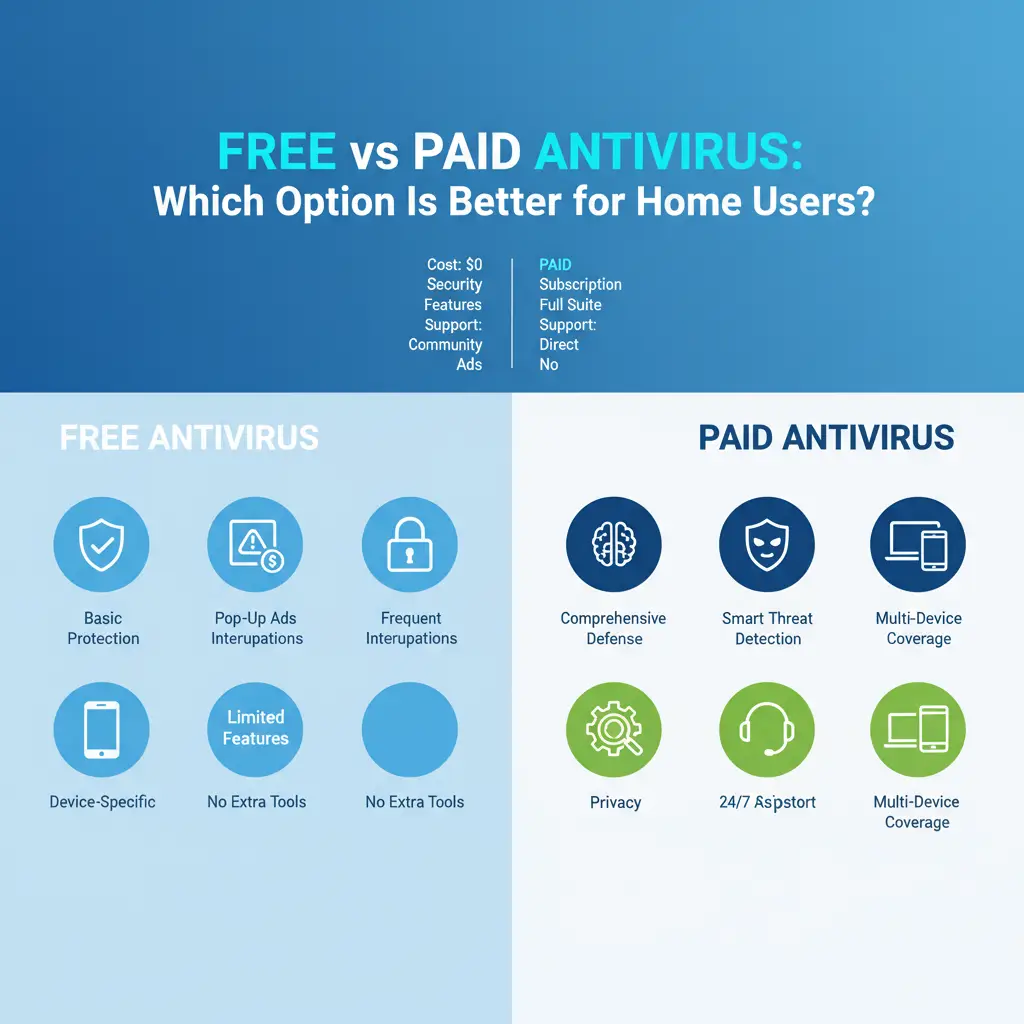
What Free Antivirus Software Offers for Home Users?
Free antivirus software offers core protection for casual home users, if your activity is just light browsing, streaming, or simple document work. Free virus protection software covers these basics very well.
Key Features of Free Antivirus Solutions
For example, if you are a Windows 10 or 11 user, Microsoft Windows Defender offers built-in protection:
- Real-time malware detection
- Automatic virus and threat removal
- Protection for internet browsing and downloads on Microsoft Edge
- Firewall and network protection
- Ransomware protection for sensitive folders
- Prevents unauthorized changes to security controls
Some other security software, like Bitdefender Free and AVG Free, provides:
- Basic malware detection and removal
- Warning systems for suspicious websites and phishing attempts
- Regular device scanning to identify infected files
- Real-time protection (in some cases, like Bitdefender Free)
- Web protection against malicious sites
- Basic firewall functionality
Limitations of Free Virus Protection - You Should Know
Though useful, free antivirus programs usually have fewer features:
- No advanced protections like VPN or identity theft monitoring
- Limited to one device
- No dedicated customer support
- Occasional ads or prompts to upgrade
- Focus mainly on known threats, not emerging ones
Here is an easy-to-compare table showcasing key features of popular free antivirus solutions vs the common limitations of free virus protection:
| Category | Microsoft Defender (Windows 10/11) | Bitdefender Free / AVG Free and Similar | Common Limitations of Free Antivirus |
|---|---|---|---|
| Real-time malware detection | Yes | Yes (Bitdefender), Limited (AVG) | Often limited or no real-time protection |
| Automatic virus and threat removal | Yes | Yes | Some lack automatic removal or delayed updates |
| Web protection | Protection for Microsoft Edge browsing and downloads | Warning systems for suspicious websites, phishing protection | Basic or limited anti-phishing |
| Firewall and network protection | Built-in firewall and network protection | Basic firewall functionality | Advanced firewall unavailable |
| Ransomware protection | Protects sensitive folders | Some ransomware protection | Limited or no ransomware protection |
| Security controls lock | Prevents unauthorized changes | Not commonly featured | Often absent |
| Device scanning | System scans available | Regular device scanning | Usually no scheduled/custom scans |
| Usability | Built-in, integrated into Windows OS | User-friendly, standalone apps | Frequent ads and upgrade prompts |
| Advanced features | None | Basic web protection, USB drive scanning, limited firewall | No VPN, identity theft monitoring, parental controls |
| Customer support | Microsoft support | Limited or none | No dedicated support |
| Licensing | Free for Windows users | Usually limited to one device | Often one device limitation |
Why Paid Antivirus Software Might Be Worth It for Home Users?
Paid antivirus software offers a new level of robust virus protection features beyond the basic, especially important for families or users with multiple devices.
What You Get with a Paid Subscription?
Advanced Threat Detection: It uses threat behavioral analysis to protect against zero-day attacks, ransomware, spyware, and unknown threats.
Additional Security Layers: Paid virus protection software offers multiple security tools, such as VPN for private browsing and while using the public Wi-Fi, an anti-phishing tool, email scanning, identity theft protection, and parental controls.
Multi-Device Coverage: One subscription is good enough to set security on multiple devices like Windows PCs, Macs, tablets, and smartphones.
Premium Support: With the paid security software, you can avail of 24/7 customer support. It helps to run the antivirus software without error.
Premium Benefits for Home Users
Paid security software includes a user-friendly dashboard to manage all your devices in one place.
Additionally, a quick contact feature, in case any errors come up on your screen, like a virus attack. Business-level features for professionals.
Overall, total virus protection for home users.
How to Decide: When to Use Free vs Paid Computer Antivirus Software?
Free antivirus protection is good enough if you are a basic user:
- Use your browser for light or low-risk web browsing.
- Need on one device protection.
- Aware of internet usage and budget-conscious.
- Reply to Microsoft Defender if you are a Windows user.
- Do not download unknown files or click on suspicious links.
Consider Paid Antivirus If You:
- Have a network connected to multiple devices, such as PCs, Macs, tablets, and smartphones.
- Often use the device for shopping, banking, or working online.
- Require VPN while using public Wi-Fi.
- Need parental control for safer family browsing.
- Need identity theft and personal data safety.
- Prefer reliable customer service when issues arise.
Comparison Table: Free vs Paid Antivirus Features for Home Users
| Features | Free Antivirus | Paid Antivirus |
|---|---|---|
| Real-time protection | Basic, mostly known threats | Advanced, zero-day & emerging threats |
| Multi-device support | Usually single device | Multiple devices & platforms |
| VPN included | No | Yes |
| Identity theft monitoring | No | Yes |
| Parental controls | No | Yes |
| Customer support | Limited or none | 24/7 live support |
| Ads or upgrade prompts | Often present | None |
Frequently Asked Questions (FAQs)
Opt for paid virus protection software that offers parental controls and safe browsing features.
Free security software comes with basic, limited features, but the paid version offers anti-phishing, firewall, and vpn protection.
Now, almost all the paid antivirus software is optimized for better and minimal performance impact; even Microsoft Defender is also lightweight software.
Make sure your security software is set to update automatically so it can always have the latest virus definitions. This way, you’ll be better protected against cyber threats.
NO, running two virus protection in the same device causes conflict and reduces its effectiveness.
Immediately contact customer support and ask for a secondary anti-malware scan.
Yes, a paid antivirus offers comprehensive protection. It gives you multi-device and personal data protection.
An antivirus designed to understand the cybercriminal behavioral activity and keep monitoring it. It scans email, links, and web browser activity for phishing attempts and blocks suspicious activity.
Yes, some robust antivirus programs offer identity theft protection.
It completely depends on your needs. A free antivirus comes with basic features and is good enough if you use a computer for light browsing, streaming, and some document work; paid versions offer robust protection.
Don’t Wait Until It’s Too Late
Best Antivirus Software Detailed Comparison — Expert Guide
Cybersecurity software is not an option; it is an essential part of our lives now, as cybercriminals are evolving their technique to steal personal data, and they are still increasing.
We see in our experience, many people use their computer for light work, and some of them use it as a professional. Choosing the right computer virus protection makes all the difference.
To help you make your decision confidently, we have created a comprehensive list of the five most trusted antivirus software – Bitdefender, Norton, McAfee, AVG, and Malwarebytes — including their pros and cons, system requirements, and reasons to buy.
1. Bitdefender Antivirus — Best for Banking & Advanced Protection
Bitdefender security is an award-winning software; it uses advanced threat detection technology and lightweight performance. In addition, it also delivers multi-layered protection against ransomware, phishing, and zero-day threats.
It uses AI technology that is suitable for home users, professionals, and businesses. In short, complete total protection.
According to independent lab tests (AV-Test, AV-Comparatives), confirmed its reliability and effectiveness.
Pros and Cons
| Pros | Cons |
|---|---|
| Excellent malware detection rates | Premium plans can be expensive |
| Lightweight and minimal system impact | VPN has limited data in lower-tier plans |
| Advanced ransomware protection | Some features require separate apps |
| Intuitive and modern user interface | Occasional upsell notifications |
| Real-time web and email protection | Customer support can be slow at times |
Reasons to Buy / Why Choose Bitdefender
Top-Rated Performance: It has been tested in a recognized lab and found to offer superior malware protection.
Layered Security: It’s a complete protection that includes antivirus, anti-tracking, and ransomware defense in one suite.
Autopilot Mode: It is easy to use even for non-technical users. It automatically optimizes itself for better performance.
Cross-Platform Protection: It works well on Windows, macOS, Android, and iOS.
Family & Privacy Features: Take care of family and their privacy. It includes parental control, VPN, and system optimization tools.
System Requirements / Specifications
| Platform / Module | Requirements Source: Bitdefender |
|---|---|
| Windows | Bitdefender on Windows requires: Operating System: Windows 7 SP1, Windows 8.1, Windows 10 or Windows 11; Windows Server 2016/2019/2022 with Desktop Experience editions Memory (RAM): 2 GB Free Disk Space: 2.5 GB (with at least 800 MB on the system drive) Software: Internet Explorer 11 Older-generation CPUs may affect performance. Only final, officially released Windows versions are supported; beta or pre-release builds are incompatible. |
| macOS | Bitdefender Antivirus for Mac requires: Operating System: macOS X Yosemite (10.10) or later Free Disk Space: 1 GB Supported Browsers (for Web Protection): Safari, Firefox, Chrome VPN functionality demands macOS Sierra (10.12) or later. Only final macOS releases are supported. |
| Android | Bitdefender Mobile Security for Android requires: Operating System: Android 6.0 or later Connectivity: Active Internet connection for cloud-based malware scanning Supported browsers for Web Protection include Chrome, Firefox, Edge, Opera, Samsung Internet, and others. |
| iOS | Bitdefender Security Apps for iOS require: Operating System: iOS 13 or later Connectivity: Active Internet connection where applicable (e.g., VPN, cloud scanning) |
| Additional Bitdefender Modules | Bitdefender’s suite includes VPN, Password Manager, Parental Control, and Central apps, each with tailored requirements: |
| VPN | Windows: Windows 7 SP1 or later; 1 GB RAM; 500 MB free disk space; .NET 4.7.2 or later macOS: macOS Sierra (10.12) or later; 100 MB free disk space Android: Android 5.1+; 100 MB storage iOS: iOS 13+; 50 MB (iPhone), 100 MB (iPad) |
| Password Manager & Parental Control | Windows 7+ (Chrome 72+, Firefox 65+, Edge Chromium 80+), macOS 10.14+, Android 5.1+/6.0+ (for fingerprint/autofill), iOS 11+/15+ |
| Bitdefender Central App | Android 5+; iOS 12+; active Internet connection |
Ideal For: Overall, good for online banking, business users, and privacy-conscious individuals.
2. Norton Antivirus — Best for Families and Identity Protection
Norton is one of the well-known major antivirus software programs. It creates a large space for home users as well as professionals. In short, it’s a worldwide brand, includes powerful malware protection, identity theft prevention, and secure VPN integration. Feature-rich suite, ideal for both families and professionals.
Pros and Cons
| Pros | Cons |
|---|---|
| Excellent protection and detection rates | Full suite can be heavy on older PCs |
| Includes password manager and cloud backup | Slightly higher cost than competitors |
| Strong identity theft and privacy tools | Limited VPN servers in some regions |
| 100% Virus Protection Promise | Occasional pop-ups about upgrades |
| 24/7 customer support | Some features limited to higher plans |
Reasons to Buy / Why Choose Norton
Real-Time Threat Protection: Uses AI-powered technology to detect and block evolving threats.
Identity Theft Shield: Includes credit monitoring and dark web alerts (premium plans).
All-in-One Solution: Other security tools, such as VPN, password manager, and cloud backup, come built-in.
Cross-Device Support: It works on Windows, macOS, Android, and iOS.
Family Safety: Parental control and tracking features protect kids online.
System Requirements / Specifications
| Platform | Operating System | Processor (CPU) | Memory (RAM) | Disk Space |
|---|---|---|---|---|
| Windows | Windows 11 (all editions except S-mode) | 1 GHz or faster | 2 GB (64-bit) / 1 GB (32-bit) | 300 MB available |
| Windows 10 (all editions except S-mode) | 1 GHz or faster | 2 GB (64-bit) / 1 GB (32-bit) | 300 MB available | |
| Windows 8.1 / 8 | 1 GHz or faster | 1 GB (32-bit) / 2 GB (64-bit) | 300 MB available | |
| Windows 7 SP1 or later | 1 GHz or faster | 1 GB (32-bit) / 2 GB (64-bit) | 300 MB available | |
| Mac | macOS 11 (Big Sur) or later (current + previous two versions) | Intel or Apple Silicon | 4 GB minimum | 300 MB available |
| NOTE: Norton Cloud Backup, Parental Control & SafeCam not supported on Mac | ||||
| Android | Android 8.0 or later (Google Play required) | ARM or x86 | 1 GB minimum | 50 MB available |
| NOTE: Multi-user mode not supported | ||||
| iOS | iOS 13.0 or later (iPhone & iPad) | A9 chip or later | — | 100 MB available |
| tvOS (Apple TV) current + previous version | A10X chip or later | — | 100 MB available | |
Ideal For: Overall, good for families, professionals, and users needing identity protection.
3. McAfee Total Protection — Best for Multi-Device and Family Security
In our experience, we noticed that McAfee Total Protection is very popular among home users, includes an all-in-one solution for antivirus, privacy, and identity protection. Basically, users love it for its user-friendly dashboard and multi-device coverage in one subscription.
Pros and Cons
| Pros | Cons |
|---|---|
| Excellent identity theft protection | Can slow down system scans |
| Multi-device protection with one license | Interface feels outdated |
| Includes VPN and password manager | Pop-up upsells can be annoying |
| Strong phishing and web protection | Mac features are limited |
| Affordable for households | Requires account sign-in for full features |
Reasons to Buy / Why Choose McAfee
Comprehensive Coverage: It covers all devices in one single subscription.
Unlimited Device Plan: Popular and ideal for multiple devices.
Identity Protection Tools: Includes the features of dark web monitoring and data cleanup.
Built-In VPN: If you frequently connect to public Wi-Fi, it helps you with safe browsing.
Affordable Value: When it comes to value, it offers comprehensive security at an affordable price.
System Requirements / Specifications
| Product | Operating System | RAM | Disk Space | Processor | Supported Browsers | Additional Requirements |
|---|---|---|---|---|---|---|
| McAfee+ | X64: Windows 11, Windows 10 (RS5+) ARM64: Windows 11+ macOS 11.x+ (Build 4.23+) ChromeOS 102.0.5005+ | 2 GB | 1.3 GB | 1 GHz | Firefox, Chrome, Safari (Mac/iOS), Edge (Chromium) | Video scam protection requires specific CPU specs |
| McAfee+ Mobile | Android 10+ iOS 16+ | N/A | N/A | N/A | N/A | N/A |
| McAfee Total Protection | X64: Windows 11, Windows 10 (RS5+) ARM64: Windows 11+ macOS 11.x+ (Build 4.23+) ChromeOS 102.0.5005+ | 2 GB | 1.3 GB | 1 GHz | Firefox, Chrome, Safari (Mac/iOS), Edge (Chromium) | Video scam protection requires specific CPU specs |
| McAfee Total Protection Mobile | Android 10+ iOS 16+ | N/A | N/A | N/A | N/A | N/A |
| McAfee LiveSafe | X64: Windows 11, Windows 10 (RS5+) ARM64: Windows 11+ macOS 11.x+ (Build 4.23+) ChromeOS 102.0.5005+ | 2 GB | 1.3 GB | 1 GHz | Firefox, Chrome, Safari (Mac/iOS), Edge (Chromium) | Video scam protection requires specific CPU specs |
| McAfee LiveSafe Mobile | Android 10+ iOS 16+ | N/A | N/A | N/A | N/A | N/A |
| McAfee Internet Security | X64: Windows 11, Windows 10 (RS5+) ARM64: Windows 11+ macOS 11.x+ (Build 4.23+) ChromeOS 102.0.5005+ | 2 GB | 1.3 GB | 1 GHz | Firefox, Chrome, Edge (Chromium) | N/A |
| McAfee AntiVirus Plus | X64: Windows 11, Windows 10 (RS5+) ARM64: Windows 11+ macOS 11.x+ (Build 4.23+) ChromeOS 102.0.5005+ | 2 GB | 1.3 GB | 1 GHz | Firefox, Chrome, Edge (Chromium) | N/A |
| McAfee AntiVirus | X64: Windows 11, Windows 10 (RS5+) ARM64: Windows 11+ | 2 GB | 1.3 GB | 1 GHz | Firefox, Chrome, Edge (Chromium) | N/A |
| McAfee Small Business Security | X64: Windows 11, Windows 10 (RS5+) ARM64: Windows 11+ macOS 11.x+ (Build 4.23+) ChromeOS 102.0.5005+ | N/A | N/A | N/A | Firefox, Chrome, Safari (Mac/iOS), Edge (Chromium) | N/A |
| McAfee WebAdvisor | X64: Windows 11, Windows 10 (RS5+) | N/A | N/A | N/A | Edge (Chromium), Firefox, Chrome, Safari (Mac/iOS) | N/A |
| McAfee Security (Mobile) | iOS 16+ Android 10+ ChromeOS 102.0.5005+ | N/A | N/A | N/A | Safari (iOS only), Chrome, Firefox, Edge (Chromium) | N/A |
| McAfee Safe Connect | Windows 11, 10, 8.1, 8, 7 (32&64-bit) Android 10+ iOS 16+ Chrome OS | N/A | N/A | N/A | N/A | Windows Enterprise not supported |
| McAfee PC Optimizer | Windows 11, 10, 8.1 (32&64-bit) | 512 MB (2 GB recommended) | 110 MB | N/A | IE, Edge, Chrome, Firefox | Windows Enterprise not supported, Internet connection required |
| McAfee Virus Removal | X64: Windows 11, Windows 10 (RS5+) ARM64: Windows 11+ | 4 GB (Windows 11/10) | N/A | N/A | N/A | Available in limited countries |
| McAfee TechCheck & TechMate | Windows 11, 10, 8.1, 8 | 4 GB+ | 500 MB | 1 GHz+ | IE 11+, Edge (Chromium), Firefox, Chrome, Safari (Mac/iOS) | Active broadband internet required |
Ideal For: Overall, good for families, multi-device households, and privacy-focused users.
4. AVG Antivirus — Best Budget-Friendly Protection
AVG Antivirus is the best virus protection for users who want powerful security at an affordable price. Its free version offers excellent core defense, while its paid version, AVG Internet Security, offers additional security features like ransomware, webcam, and phishing protection. Moreover, its lightweight design makes it ideal for older PCs or laptops.
Pros and Cons
| Pros | Cons |
|---|---|
| Excellent free version available | Paid version adds cost for advanced tools |
| Lightweight and fast | Lacks identity theft protection |
| Regular automatic updates | VPN sold separately |
| Great for beginners | No parental controls |
| Real-time threat and email scanning | Limited support for free users |
Reasons to Buy / Why Choose AVG
Free and effective: You can get strong real-time protection even in its free version.
Shared engine with Avast: Uses the same globally trusted detection core.
Low system impact: Runs smoothly without slowing down computer performance.
Browser cleanup tool: It’s also great for computer optimization, such as removing tracking cookies or phishing URLs.
Affordable upgrade path: Budget-friendly premium features.
System Requirements / Specifications
| Category | Requirements |
|---|---|
| Operating System | Windows 11 (except Mixed Reality and IoT Edition) Windows 10 (except Mobile and IoT Edition) - 32 or 64-bit Windows 8/8.1 (except RT and Starter Edition) - 32 or 64-bit Windows 7 Service Pack 1 with Convenience Rollup Update or later, any Edition - 32 or 64-bit |
| Processor | Intel Pentium 4 or AMD Athlon 64 or above, must support SSE3 instructions. ARM-based devices not supported. |
| Memory (RAM) | 1 GB or above |
| Storage | 2 GB free disk space |
| Display | Standard screen resolution no less than 1024 x 768 pixels |
| Network | Internet connection required for download, activation, and updates |
| Business Edition (Additional) | Windows Server versions: 2022, 2019, 2016, 2012 (any edition with latest service pack excluding Server Core) Exchange Server support: 2019, 2016, 2013, 2010 SP2 SharePoint Server support: 2019, 2016, 2013, 2010 |
Ideal For: This computer virus protection is for students, lightweight work users, or budget-friendly protection.
5. Malwarebytes Premium — Best for Advanced Threat & Malware Removal
Malwarebytes is a very good anti-malware security software that acts as a secondary defense layer. But its premium version includes antivirus as well as powerful malware and ransomware removal tools.
Additionally, this is a very lightweight version of the software that does not slow down your computer’s performance, and it specializes in detecting zero-day exploits and adware infections before they can damage your system.
Pros and Cons
| Pros | Cons |
|---|---|
| Exceptional malware and ransomware removal | Free version lacks real-time protection |
| Lightweight and fast | Fewer extra features |
| Works alongside other antivirus tools | VPN only in premium plan |
| Excellent behavior-based detection | No parental or identity tools |
| Simple dashboard | No built-in firewall |
Reasons to Buy / Why Choose Malwarebytes
Zero-Day Protection: It’s amazing protection that instantly detects and neutralizes emerging threats.
Lightweight Performance: The best part is that it doesn’t slow down system performance at all during scanning.
Compatibility: It protects your system like a secondary shield.
Constant Updates: It keeps updating its malware definitions.
Money-Back Guarantee: The Premium plan comes with a 60-day money-back guarantee, giving you peace of mind.
System Requirements / Specifications
| Category | Platform | Operating System | Hardware Requirements | Notes |
|---|---|---|---|---|
| Desktop Security | Windows | Windows 11, 10, 8.1, 8, 7 SP1 | - Memory: 4 GB minimum (8 GB recommended) - Disk Space: 1 GB at installation - CPU: 800MHz or faster with SSE2 - Screen Resolution: 1024×768 or higher - Internet: Active connection required | - |
| macOS | macOS Sequoia 15, Sonoma 14, Ventura 13, Monterey 12, Big Sur 11 | - Compatible with Intel & Apple Silicon - No minimum RAM or disk specified - Internet connection required | - ARM Windows 11 supported | |
| Mobile Security | Android | Android 9 to 16, ChromeOS with Google Play | - Various free and paid security features available | - Internet connection required |
| iOS/iPadOS | iOS 17, 18; iPadOS 17, 18; visionOS 1.0+ | - Various free and paid security features available | - Internet connection required; no ChromeOS support | |
| Business Solutions | Windows | Windows 11, 10, 8.1, 8, 7 SP1; Server versions 2008 R2 to 2022 | - CPU: 1 GHz minimum - RAM: 1 GB (client), 2 GB (server) - Disk Space: 100 MB - .NET Framework 4.6.2 and TLS 1.2 required | - Server Core not supported; FIPS supported on Win10+ |
| macOS | Sequoia 15, Sonoma 14, Ventura 13, Monterey 12, Big Sur 11 | - Compatible with Intel & Apple Silicon; Internet required | - macOS 10.x unsupported from May 2025 | |
| Business Solutions | Linux | Debian, RHEL, Ubuntu, CentOS, SUSE, Amazon Linux, Rocky Linux (various versions) | - CPU: 1 GHz (2 core) - RAM: 2 GB (4 GB for EDR) - Disk Space: 1 GB - Linux Kernel 3.10+ for EDR - Dynamic Kernel Management System required on some distros | - Systemd required for WSL 2 support |
| Legacy Products | AdwCleaner | Windows 11, 10, 8.1 (XP, Vista, 7, 8 unsupported) | - CPU: 800 MHz minimum - RAM: 512 MB minimum - Disk Space: 10 MB minimum - Screen Resolution: 1024×768 recommended | - |
| Malwarebytes Anti-Malware/Anti-Exploit (Legacy) | Windows various versions | - CPU: 800 MHz - RAM: 1-2 GB depending on system - Disk Space: 10-25 MB - Screen Resolution: 800x600 or greater | - | |
| Performance and Network | - Light system footprint, automatic updates. - Real-time protection uses additional resources during scans. - Business deployments: reserve 1.1 Mbps per 100 endpoints. - Active internet connection required for updates and cloud features. - End-of-Life support for older Windows versions from July 2025. | |||
Ideal For: Overall, it is good for users who are seeking an extra layer of protection against advanced malware.
Final Thoughts – What Matters Most
First and foremost, as a user, you need to analyze yourself, what type of user you are – such as you are a basic or casual user who is just using your computer for light internet browsing, streaming, or a few document works.
On the other hand, are you a professional or a kind of user who uses the computer for banking, some research work, or does some important task, or does your family need a security feature to protect their family from cyber threats?
Moreover, Also, consider additional features that can enhance your device’s security – such as VPNs, password managers, and parental controls.
Overall, first understand your basic needs and then decide that this antivirus is best for you, and do not just buy any other antivirus.
Don’t wait, make this important decision for your digital safety before it’s too late. Act now, stay proactive, and choose the antivirus solution that truly fits your digital lifestyle.
Your digital life deserves complete protection. Whether it’s protecting your family, securing online transactions, or enhancing system performance — Antivirus Support helps you make the right choice with confidence.
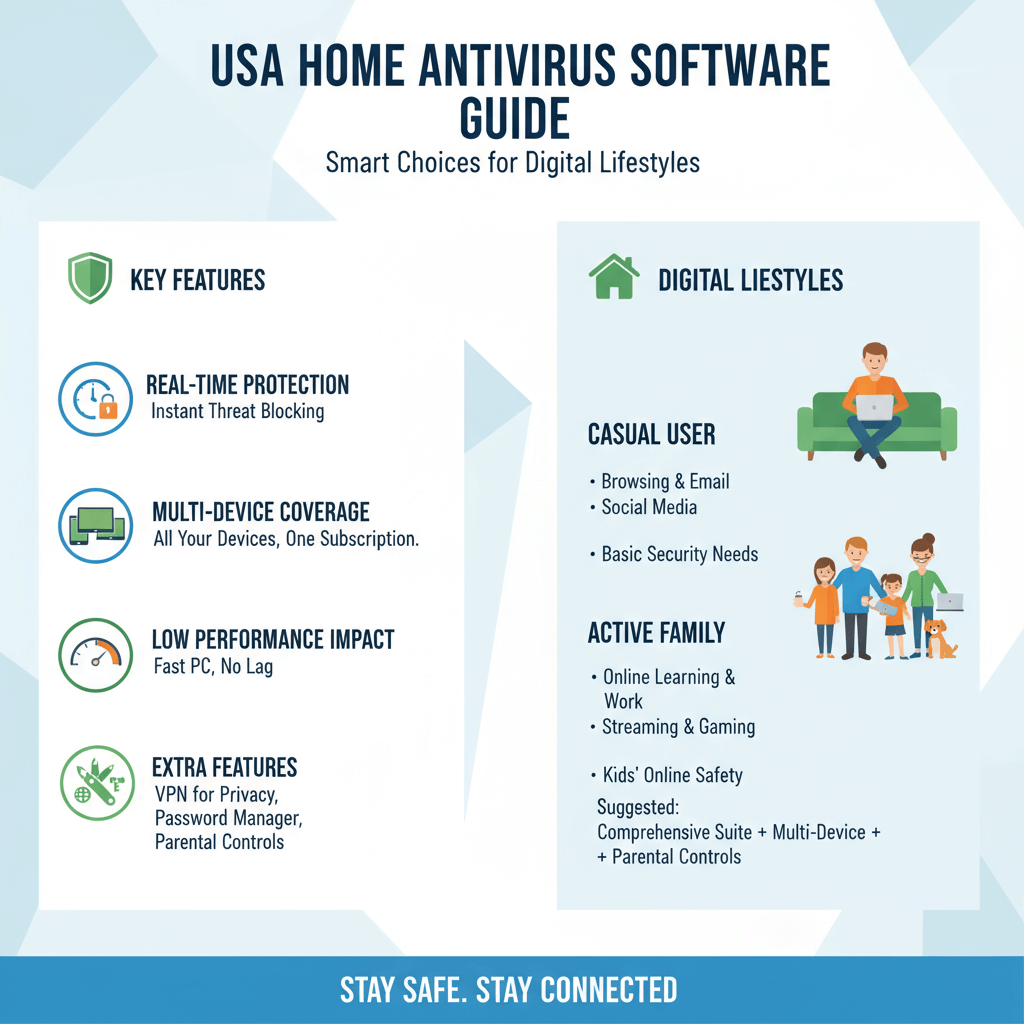
About Antivirus Support Team
The Antivirus Support Team has over 12 years of experience in helping with antivirus software support and computer technical troubleshooting. We are trained in real-world issues users face daily - from installation errors, activation errors, virus & malware removal, to performance optimization and update troubleshooting.
Our mission is to help home and non-tech users, because we know that security shouldn’t be confusing. Every blog we publish in practical experience and up-to-date knowledge of cybersecurity trends.
Trust the Antivirus Support Team to guide you safely in the digital world.

